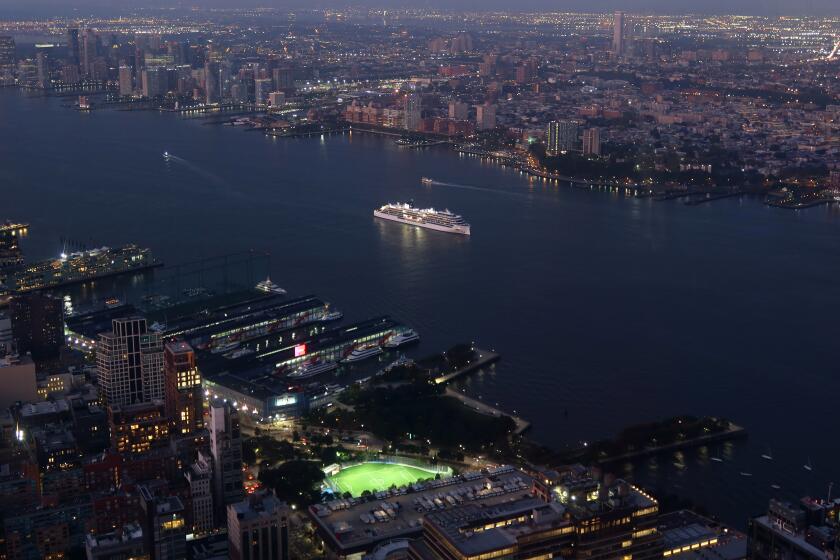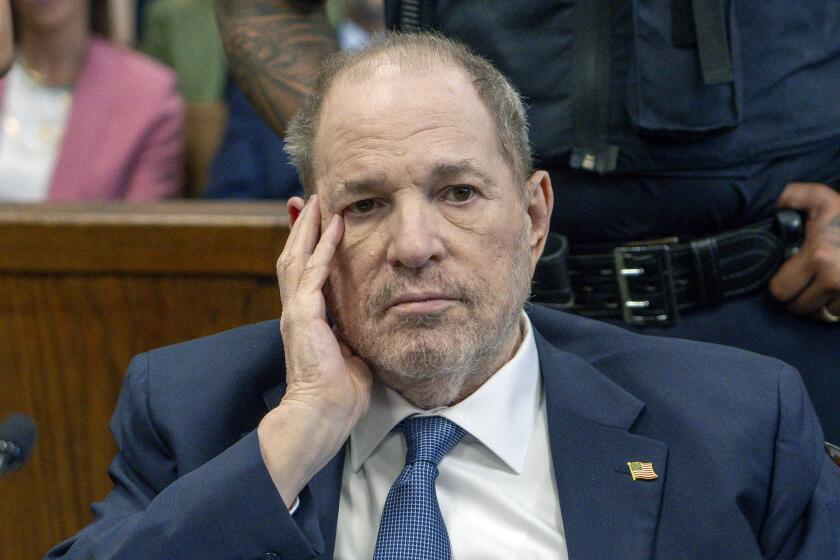In Iraq, Life Revolves Around an Omnipresent Leader
From the top of the 14-story Al Rashid Hotel in this war-threatened capital, one can look out on a fanciful array of glass, concrete and steel monuments that are extensions of the mind of Iraqi President Saddam Hussein.
There is the Tomb of the Unknown Soldier, shaped like a flying saucer, sized like a football stadium and crowned with a ziggurat in the colors of the Iraqi flag.
Nearby are oversized sculptures of Hussein’s hands holding crossed scimitars, at either end of a mile-long military parade ground. To the right is the headquarters of the ruling Baath Party, resurrected after it was leveled by a U.S. cruise missile four years ago, and a four-sided Hussein clock.
In the distance is a new Republican Palace, with busts of the president dressed as the medieval warrior Saladin on each of its four pediments. And there is the grand Rahman Mosque, a nest of domes rising like a mountain out of the flat green earth.
This extravagant architecture -- the president is said to approve every design -- illustrates how Hussein has taken the clay of this fabled Middle Eastern country and shaped it to reflect his gargantuan ambitions.
Hussein has been, in effect, leader of Iraq for more than three decades -- longer than Josef Stalin ran the Soviet Union -- and has been president since 1979. He has commanded total loyalty and adulation from his country. If he is deposed in a U.S.-backed war, it will take years, maybe generations, to erase his imprint on the country.
For ordinary Iraqis, Hussein defines Iraq -- is Iraq -- and they find it difficult to believe that this is all about to end. What, they wonder, would it mean for a country in which Hussein’s image is more of an icon than the Iraqi flag and children chant his name like an alphabet song?
‘Absolute Faith’
“We have absolute faith in God and in Saddam Hussein. He has given us everything,” said Sheik Sebe Nadawi, the traditional leader of Rashdiya village, just north of Baghdad.
Defeat in war has not deterred Hussein. Neither have 12 years of choking economic sanctions. Nor the condemnations in much of the world of him as a cruel, bloodthirsty tyrant.
Each defeat, in fact, somehow has made him larger at home, and sometimes abroad. The liquid wealth beneath the sand has provided the means. And the people of Iraq have, for the most part, gone along, perhaps out of fear or a kind of shared pride in the ruthless reach for greatness.
Before a disastrous 1980-88 war with Iran, which started Iraq’s long downward spiral, people remember a good life paid for by the government. Many were sent abroad to study for free, health-care standards were comparable to those of Europe, and Iraqis were the envy of their Middle Eastern neighbors for their learning and modernity.
Since then, sanctions have driven the country down. But Hussein has continued to boost his image, with streets, bridges and shopping centers named after him and even after his birthday. His picture is on the wall of every office and business and on every lavender-colored bill in people’s pockets.
Hussein’s devoutly loyal Baath Party, meanwhile, reaches into every neighborhood, reinforcing cohesion, dispensing advice and providing military training to defend the country.
Brief War Expected
U.S. military planners and Western analysts predict a relatively brief war, with “regime change” -- the fall of Hussein -- as the final result.
Many Iraqis argue that the United States will be forced back by international pressure or, if there is a war, that Iraq will resist and eventually prevail.
If, however, the war goes as the Bush administration assumes, the huge edifice of Hussein’s state would come crashing down as surely as many of the spectacularly grandiose buildings.
There are no immediate models for Iraq after Hussein.
The Middle East is made up of monarchies and sheikdoms, or strongman states in the Nasserist tradition, and nothing else.
There is no current model of a working democracy that could fill the void if Hussein was removed, although Iraqi opposition forces have spoken of a federal republic run by an elected president or prime minister.
And how would American intervention be received? Although some might expect scenes of flowers tossed and American flags waved in welcome, as when the GIs liberated Paris in 1944, the dominant impression here is that -- no matter how much they may have suffered under the current system -- many Iraqis would feel lost and disoriented if Hussein was gone.
Having grown up with his image in their classrooms, on their televisions, on friezes near their markets and on the front of every newspaper every day, there may be a societal vertigo if Hussein vanishes from the scene.
Not only party members or those with a vested interest, but also many ordinary Iraqis whose lives have been shaped by the leader may find themselves bereft, as though their country has lost not just its president, but also its father, king and emblem.
Life Without Him
Many Iraqis say they simply cannot imagine life without him.
“Can a person live without water and air? We cannot live without Saddam Hussein,” said Hurriya Hamidei Ahmad, a religion teacher in the city of Mosul. “If Saddam Hussein said, ‘Kill yourself,’ I would do it.”
Hussein molds Iraqis’ day-to-day reality. When he speaks during his frequent television appearances of Iraq’s “victory” over the U.S. in the 1991 Persian Gulf War, his message is reinforced and echoed in countless articles and radio and television commentaries, becoming etched in the minds of the citizens.
What to Americans would seem a gross distortion -- that the Iraqi army defended itself so valiantly after its voluntary withdrawal from Kuwait that the U.S.-led coalition was forced to plead for a cease-fire -- is accepted as truth here.
After all, Iraqis ask, if their nation lost, why is Hussein still in power? It is the U.S. version they dismiss as propaganda.
Some members of the Baath Party elite -- those who shared the high points and the low with the government, and partook of some of its grand dreams and sacrifices -- are already sounding a note of nostalgia and wistfulness as they contemplate the end of life as they have known it.
With American and British forces massed on the borders, it is a difficult time for the true believers, said one Iraqi academic, adding, “Deep inside, they did not meet the expectations of the party or the population, and they know their days are numbered.”
Yet there is also a sense that Hussein made their country important and a state to be reckoned with.
An insight into the sense of grandeur Hussein has given the nation, aside from the trouble and suffering, came when a Kuwaiti official dared last week to challenge Iraqi envoy Izzat Ibrahim at an Islamic summit in Qatar.
“Shut up, you monkey,” Ibrahim replied imperiously. “Don’t you know you’re talking to Iraq?”
An apt metaphor for Hussein is a statue of him in front of the Industry Ministry in Baghdad. It is an oft-repeated motif -- Hussein in late middle age, dressed in a baggy business suit and homburg hat, holding a rifle aloft with one hand.
The statue is life-size, looking small on its narrow pedestal in front of the ministry. But at night, when it is lighted from below by a spotlight, it casts an enormous shadow over the entire building. Much as one man has cast his shadow over a nation.
More to Read
Start your day right
Sign up for Essential California for news, features and recommendations from the L.A. Times and beyond in your inbox six days a week.
You may occasionally receive promotional content from the Los Angeles Times.





